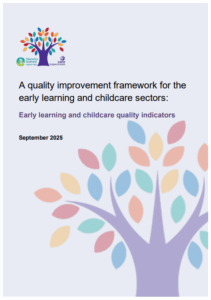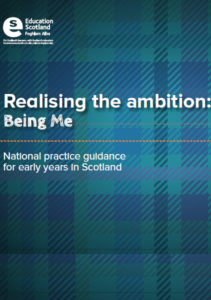Play, learning and developing – p29 Child-centred planning and assessment
“Careful observations and effective assessments recognise and promote children’s progress and achievements. Any additional supports are identified, planned for and implemented. Our highly responsive approach ensures children are developing a broad range of knowledge, understanding and skills for life and learning.”
What approaches are we using to promote children’s developing skills over a broad range of areas, such as emotional and social development, emergent language skills, literacy and numeracy?
How do we ensure our approach to children’s needs recognises the independent thoughts and feelings of children as individuals?
Learning, teaching and assessment – p42 Tracking and monitoring
“Staff use very effective systems to monitor, record, evaluate and report on children’s progress across the curriculum, including children who may experience barriers to their learning.”
How robust are our processes for tracking and monitoring to identify children’s strengths, individual needs, or gaps in their experiences or learning?
Nurturing care and support – p47 Personal planning
“Personal plans promote children’s rights and value the individuality of each child and their family. Personal plans are tailored to each child’s individual strengths, needs and interests. We create meaningful plans with children and regularly review these to ensure plans are suitable and supportive.”
How do we know that all staff fully understand and implement our approaches to
inclusion, diversity and equity?
How well do staff understand and champion the rights of care experienced children and families?
In what ways do we communicate with children, families and/or partner professionals to jointly plan children’s care and support?
Wellbeing, inclusion and equality – p54 Universal support
“We provide all children with highly effective support and encouragement to ensure everyone is included. Inclusive practice is embedded across our universal provision, enabling children with additional support needs to access learning in a way that works for them.”
Wellbeing, inclusion and equality – p55 Identifying and assessing learning needs and targeted support
“Children’s individual learning needs are identified early through careful observation and effective analysis of robust assessment information from a range of sources.”
“We ensure that children with additional support needs are identified early and supported through well-planned, regularly reviewed interventions.”
“Staff are confident in using a range of inclusive strategies and resources to meet the diverse range of children’s needs.
“We provide high-quality targeted support to all children who require additional support, including access to digital technology, to reduce barriers to inclusion and learning.”
“Children, families and partners are fully involved in reviewing children’s progress and making decisions about future learning and support. Targeted interventions are highly effective and lead to positive outcomes for children.”
Wellbeing, inclusion and equality – p56 Inclusion and equality
“Highly effective strategies are in place to improve progress for all children with a clear focus on those facing challenges or barriers to their learning or inclusion.”
How well do we meet the needs of individual children, including those facing additional challenges?
How effective is our approach to planning for children requiring additional support?
How effectively do we involve parents/carers and partners in planning and delivering targeted support for individual children?
To what extent do we have regular, high-quality professional learning to support
wellbeing, inclusion and equality? What impact does this professional learning have?
To what extent do we have a comprehensive and shared, understanding of our
legislative duties to support all children?
Children’s progress – p59 Children’s progress over time
“All children, including those with additional support needs are supported very well to make choices and share their learning and progress in their own individual way”
Safeguarding and child protection – p65 Legislation, policy and guidance in practice
“We pay particular attention to the unique needs of individual children, including those with additional support needs or who are care experienced”


